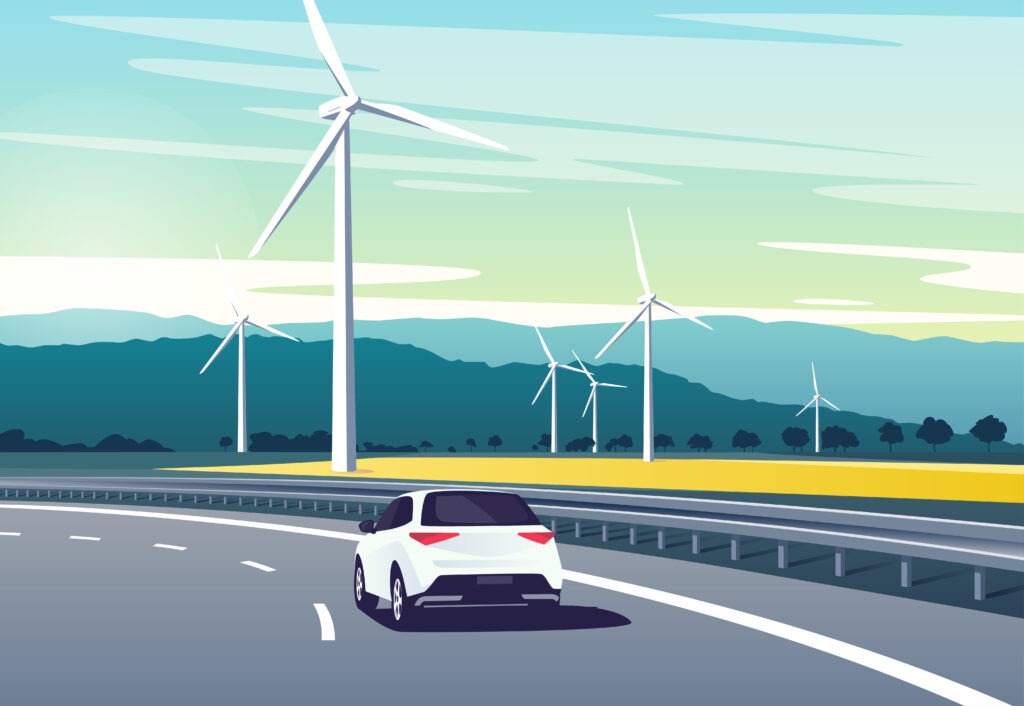German new-car market slumps into worrying decline in August
06 September 2024

The German new-car market recorded a significant registrations decline in August, with battery-electric vehicles (BEVs) driving the downfall. Tom Hooker, Autovista24 journalist, investigates the result.
A total of 197,322 new cars took to German roads in August, slumping 27.8% year on year. It marks the biggest monthly decline since November 2021.
From this point onwards, the industry was hit by semiconductor shortages, supply chain disruption and Russia’s invasion of Ukraine. Despite this, data provided by the Kraftfahrt-Bundesamt (KBA), highlights that August 2024 saw the worst delivery total in three years.
Last month’s performance was also the smallest registration total since January 2023. Every powertrain suffered a delivery drop last month, with four posting their largest volume decrease of 2024 so far.
This dragged Germany’s year-to-date result into decline compared with the same period in 2023. The market went from a 4.3% improvement in the first seven months of the year to a 0.3% drop from January to August.
BEV deliveries plummet
BEV deliveries plummeted 68.8% last month to 27,024 units. This equated to a drop of almost 60,000 units compared with August 2023.
This was the seventh month of consecutive decline for the technology, with six of these in the double digits. Additionally, it was the fourth month in a row to endure a volume decrease of at least 10%.
The BEV market share slumped by 18 percentage points (pp) in August to 13.7%. However, this was the second-highest share of 2024 for the powertrain.
In the year to date, BEV registrations were down 32% to 241,911 units, according to Autovista24 calculations. The technology accounted for 12.7% of the German new-car market in the year to date, dropping from 18.6% recorded one year ago.
The Verband der Automobilindustrie (VDA) forecast a 25% slump in BEV registrations by the end of 2024, equating to 393,200 units.
‘We are currently experiencing a crash in new passenger car registrations,’ said German Central Association for Motor Trades (ZDK) vice president Thomas Peckruhn. ‘The decline in registrations of battery-electric cars is dramatic.’
German subsidies skew result
However, this result was heavily skewed by figures from August 2023, which were recorded amid an abnormal market situation.
‘A special effect was also responsible for the historic slump of more than two-thirds in BEVs. After the abolition of the purchase bonus for commercial customers was announced for September 2023, the registration figures for purely battery-electric cars peaked in August last year,’ explained André Schmidt, the newly elected president of the Association of International Motor Vehicle Manufacturers (VDIK).
Thanks to a delivery surge of 170.7%, BEVs led the German new-car market in August 2023. The technology took a 31.7% share in the month, a feat not replicated by BEVs since.
‘The current slump therefore not entirely surprising, but it is nevertheless very powerful. Above all, the decline in the overall market by more than a quarter of the passenger car volume is an additional blow to the automotive industry,’ Schmidt stated.
According to Autovista24 calculations, excluding BEVs from Germany’s registration total, the market declined only 8.8% in August. Removing the powertrain from the year-to-date total turns a 0.3% drop into 6.9% growth.
German tax break support
The German government recently proposed new measures to incentivise electric cars. Companies may soon be able to deduct up to 40% of the value of new BEVs or other qualifying zero-emission vehicles from their tax bill, provided this was the same year of purchase.
‘We welcome the measures adopted by the Federal Cabinet to strengthen e-mobility. This is an important and correct signal, which is urgently needed, especially given the abrupt discontinuation of the environmental bonus at the end of last year and the current weaker demand for electric vehicles,’ commented VDA president Hildegard Müller.
However, the ZDK noted that further subsidies are needed to ramp-up BEV volumes. ‘The tax relief for electric vehicles planned by the federal government is just a drop in the ocean for a necessary trend reversal and only helps commercial registrations,’ outlined Peckruhn.
‘We are looking with concern to the coming year, when the tightened CO2 targets will increase the pressure on manufacturers to promote e-mobility in order to avoid fines. If more incentives are not provided, the ramp-up will not succeed,’ he stated.
Furthermore, BEVs or zero-emission company cars valued at €95,000 or less will qualify for preferential tax treatment, an increase of at least €20,000 from the previous boundary.
The VDA also supports this proposal. ‘The increase in the assessment basis for the reduced company car tax (from €70,000 to €95,000) for purely battery-electric vehicles is helping to accelerate the ramp-up of e-mobility in Germany,’ Müller highlighted.
PHEVs biggest monthly decline
August also saw plug-in hybrids (PHEVs) record their biggest decline so far in 2024. However, compared to BEVs, this was a much smaller decrease of 6.8%, with 13,565 registrations. This was the powertrain's lowest monthly delivery total so far this year.
Despite this, its market share of 6.9% was the powertrain’s best result so far in 2024. This was 1.6pp up from its August 2023 performance, as it benefitted from BEV difficulties.
From January to August, PHEVs reached 117,925 registrations, an increase of 9.2%. August’s poor result dragged this growth below double-digits. In the first eight months of the year, the technology captured 6.2% of the new-car market, up 0.6 year on year.
Embarrassing EV performance
Combining BEV and PHEV volumes, a total of 40,589 EVs took to German roads in August, a drop of 59.9% year on year. This was the fourth consecutive month of plug-in decline, with six recorded in 2024 so far.
In August, the EV share reached its highest point so far this year, reaching 20.6%. However, this was 16.4pp down from its market hold one year ago. In the first eight months of the year, plug-in deliveries were down 22.4%, with 359,836 units.
Following last month’s report, passenger car CO2 emissions jumped 23.7% in August, the highest rise recorded so far this year. From January to August, emissions have increased by 4.5%. This shows the importance of a country's EV market in reaching its sustainability goals.
Diesel deliveries down
Diesel deliveries were down by 24.4% in August, with 29,974 units. This was the powertrain's biggest decline this year and its only double-digit decrease so far in 2024. Additionally, it was diesel’s lowest monthly volume this year by almost 11,000 units. It accounted for 15.2% of registrations, down from 14.5% in August 2023.
In the year to date, volumes were up 4%, with 348,433 units. Diesel currently sits over 100,000 deliveries ahead of BEVs as the third most-popular powertrain in Germany. At the same point last year, diesel was more than 20,000 registrations behind the electric technology.
Diesel took an 18.3% market share in the first eight months of the year, an improvement of 0.8pp year on year.
Low petrol volumes in German market
With 70,007 deliveries, petrol volumes were 7.4% down in August. This was the powertrain’s lowest monthly total so far in 2024, and the smallest figure since January 2023. Petrol’s share sat at 35.5%, up 7.9pp. This marked its biggest year-on-year share growth of 2024 so far.
From January to August, petrol registrations rose 4.9%, with 703,990 units. Its market share was up 1.8pp compared to the same period last year, sitting at 36.9%.
Combining diesel and petrol deliveries, the internal combustion engine (ICE) market was down 13.1% last month, with 99,981 units. So far, this is the powertrain grouping’s only double-digit decline in 2024. It also marked the second volume decline so far this year, with the first posted in March.
August was the lowest monthly ICE total by over 19,000 units. This resulted in its worst share of 2024 at 50.7%, 2.4pp behind July, its second-lowest performance. However, its share was 8.6pp ahead of August 2023’s result.
In the year to date, registrations increased by 4.6% year on year, reaching just under 1.1 million units. ICE accounted for 55.2% of new-car deliveries, up from 52.6% during the first eight months of 2023.
Hybrid hold steady
Hybrids, including full and mild hybrids, were the most stable powertrain in August, dropping just 0.1% with 55,779 units. This was the smallest monthly registrations figure for hybrids since February.
It was also the technology’s third decline this year, with the most severe being 0.7% in May. Yet, hybrids enjoyed their highest share of the year at 28.3%. This was 1pp up from July, currently hybrid’s second-highest share of 2024. Furthermore, it was an increase of 7.9pp from August last year.
In the first eight months of the year, the technology saw deliveries jump 11.9% with 484,804 units. It is currently the only powertrain in Germany to hold a double-digit increase in the first eight months of 2024. This positive performance was apparent in its market share, up 2.8pp to 25.4%.
The ‘others’ category, including fuel-cell electric vehicles, natural gas and liquified petroleum gas vehicles, E85/ethanol and other fuels, declined 12% in August. The category reached 973 registrations according to Autovista24 calculations.
It accounted for 0.3% of the new-car market in the month, down from 0.5%. In the year to date, deliveries were down 2.4% with 10,035 units. This gave the category a market share of 0.6%, up 0.1pp year on year.



